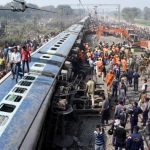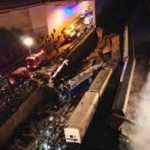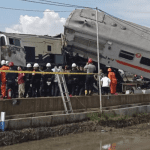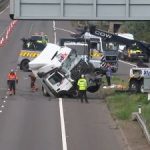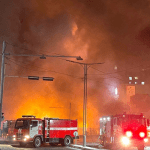India has begun an investigation into a train collision in West Bengal that killed nine people and injured over 50, a day after a top railway official blamed the event on driver error.
The investigation by India’s top railway safety official will begin on Tuesday, according to Chetan Kumar Shrivastava, the general manager of the Northeast Frontier Railway, where the disaster occurred.
The investigation will include eyewitness reports, a review of official documentation, and testimony from railway authorities about signalling and other mandatory safety issues,” he added.
India’s top railway official claimed the freight train’s driver, who was among the deceased, ignored a signal, resulting in the collision with the Kanchanjunga Express, which had stopped outside a railway station in the Darjeeling area.
There were 1,400 people aboard, a railway spokesperson said.
But the media said an automatic signaling system had not been working from Monday morning, prompting authorities to advise train drivers to proceed slower than usual, in a process known as “paper signals.”
India’s opposition leaders criticised the railway safety record of Prime Minister Narendra Modi’s government, attributing it to negligence.
The incident came a little over a year after about 288 people were killed in one of India’s worst rail crashes in the neighbouring state of Odisha, caused by a signaling error.
State-run Indian Railways, known for overcrowding, is the world’s fourth largest train network, transporting 13 million people per day and approximately 1.5 billion tonnes of freight in 2022.
In remarks to the media on Monday, top railway official Jaya Varma Sinha, who leads India’s railway board, urged for a reduction in human error and stated that an anti-collision system was being implemented statewide.
Partial services resumed on the affected tracks on Tuesday, with some trains being diverted and others running slower than usual, railway authorities said.
India has begun an investigation into a train collision in West Bengal that killed nine people and injured over 50, a day after a top railway official blamed the event on driver error.
The investigation by India’s top railway safety official will begin on Tuesday, according to Chetan Kumar Shrivastava, the general manager of the Northeast Frontier Railway, where the disaster occurred.
The investigation will include eyewitness reports, a review of official documentation, and testimony from railway authorities about signalling and other mandatory safety issues,” he added.
India’s top railway official claimed the freight train’s driver, who was among the deceased, ignored a signal, resulting in the collision with the Kanchanjunga Express, which had stopped outside a railway station in the Darjeeling area.
There were 1,400 people aboard, a railway spokesperson said.
But the media said an automatic signaling system had not been working from Monday morning, prompting authorities to advise train drivers to proceed slower than usual, in a process known as “paper signals.”
India’s opposition leaders criticised the railway safety record of Prime Minister Narendra Modi’s government, attributing it to negligence.
The incident came a little over a year after about 288 people were killed in one of India’s worst rail crashes in the neighbouring state of Odisha, caused by a signaling error.
State-run Indian Railways, known for overcrowding, is the world’s fourth largest train network, transporting 13 million people per day and approximately 1.5 billion tonnes of freight in 2022.
In remarks to the media on Monday, top railway official Jaya Varma Sinha, who leads India’s railway board, urged for a reduction in human error and stated that an anti-collision system was being implemented statewide.
Partial services resumed on the affected tracks on Tuesday, with some trains being diverted and others running slower than usual, railway authorities said.
India has begun an investigation into a train collision in West Bengal that killed nine people and injured over 50, a day after a top railway official blamed the event on driver error.
The investigation by India’s top railway safety official will begin on Tuesday, according to Chetan Kumar Shrivastava, the general manager of the Northeast Frontier Railway, where the disaster occurred.
The investigation will include eyewitness reports, a review of official documentation, and testimony from railway authorities about signalling and other mandatory safety issues,” he added.
India’s top railway official claimed the freight train’s driver, who was among the deceased, ignored a signal, resulting in the collision with the Kanchanjunga Express, which had stopped outside a railway station in the Darjeeling area.
There were 1,400 people aboard, a railway spokesperson said.
But the media said an automatic signaling system had not been working from Monday morning, prompting authorities to advise train drivers to proceed slower than usual, in a process known as “paper signals.”
India’s opposition leaders criticised the railway safety record of Prime Minister Narendra Modi’s government, attributing it to negligence.
The incident came a little over a year after about 288 people were killed in one of India’s worst rail crashes in the neighbouring state of Odisha, caused by a signaling error.
State-run Indian Railways, known for overcrowding, is the world’s fourth largest train network, transporting 13 million people per day and approximately 1.5 billion tonnes of freight in 2022.
In remarks to the media on Monday, top railway official Jaya Varma Sinha, who leads India’s railway board, urged for a reduction in human error and stated that an anti-collision system was being implemented statewide.
Partial services resumed on the affected tracks on Tuesday, with some trains being diverted and others running slower than usual, railway authorities said.
India has begun an investigation into a train collision in West Bengal that killed nine people and injured over 50, a day after a top railway official blamed the event on driver error.
The investigation by India’s top railway safety official will begin on Tuesday, according to Chetan Kumar Shrivastava, the general manager of the Northeast Frontier Railway, where the disaster occurred.
The investigation will include eyewitness reports, a review of official documentation, and testimony from railway authorities about signalling and other mandatory safety issues,” he added.
India’s top railway official claimed the freight train’s driver, who was among the deceased, ignored a signal, resulting in the collision with the Kanchanjunga Express, which had stopped outside a railway station in the Darjeeling area.
There were 1,400 people aboard, a railway spokesperson said.
But the media said an automatic signaling system had not been working from Monday morning, prompting authorities to advise train drivers to proceed slower than usual, in a process known as “paper signals.”
India’s opposition leaders criticised the railway safety record of Prime Minister Narendra Modi’s government, attributing it to negligence.
The incident came a little over a year after about 288 people were killed in one of India’s worst rail crashes in the neighbouring state of Odisha, caused by a signaling error.
State-run Indian Railways, known for overcrowding, is the world’s fourth largest train network, transporting 13 million people per day and approximately 1.5 billion tonnes of freight in 2022.
In remarks to the media on Monday, top railway official Jaya Varma Sinha, who leads India’s railway board, urged for a reduction in human error and stated that an anti-collision system was being implemented statewide.
Partial services resumed on the affected tracks on Tuesday, with some trains being diverted and others running slower than usual, railway authorities said.
India has begun an investigation into a train collision in West Bengal that killed nine people and injured over 50, a day after a top railway official blamed the event on driver error.
The investigation by India’s top railway safety official will begin on Tuesday, according to Chetan Kumar Shrivastava, the general manager of the Northeast Frontier Railway, where the disaster occurred.
The investigation will include eyewitness reports, a review of official documentation, and testimony from railway authorities about signalling and other mandatory safety issues,” he added.
India’s top railway official claimed the freight train’s driver, who was among the deceased, ignored a signal, resulting in the collision with the Kanchanjunga Express, which had stopped outside a railway station in the Darjeeling area.
There were 1,400 people aboard, a railway spokesperson said.
But the media said an automatic signaling system had not been working from Monday morning, prompting authorities to advise train drivers to proceed slower than usual, in a process known as “paper signals.”
India’s opposition leaders criticised the railway safety record of Prime Minister Narendra Modi’s government, attributing it to negligence.
The incident came a little over a year after about 288 people were killed in one of India’s worst rail crashes in the neighbouring state of Odisha, caused by a signaling error.
State-run Indian Railways, known for overcrowding, is the world’s fourth largest train network, transporting 13 million people per day and approximately 1.5 billion tonnes of freight in 2022.
In remarks to the media on Monday, top railway official Jaya Varma Sinha, who leads India’s railway board, urged for a reduction in human error and stated that an anti-collision system was being implemented statewide.
Partial services resumed on the affected tracks on Tuesday, with some trains being diverted and others running slower than usual, railway authorities said.
India has begun an investigation into a train collision in West Bengal that killed nine people and injured over 50, a day after a top railway official blamed the event on driver error.
The investigation by India’s top railway safety official will begin on Tuesday, according to Chetan Kumar Shrivastava, the general manager of the Northeast Frontier Railway, where the disaster occurred.
The investigation will include eyewitness reports, a review of official documentation, and testimony from railway authorities about signalling and other mandatory safety issues,” he added.
India’s top railway official claimed the freight train’s driver, who was among the deceased, ignored a signal, resulting in the collision with the Kanchanjunga Express, which had stopped outside a railway station in the Darjeeling area.
There were 1,400 people aboard, a railway spokesperson said.
But the media said an automatic signaling system had not been working from Monday morning, prompting authorities to advise train drivers to proceed slower than usual, in a process known as “paper signals.”
India’s opposition leaders criticised the railway safety record of Prime Minister Narendra Modi’s government, attributing it to negligence.
The incident came a little over a year after about 288 people were killed in one of India’s worst rail crashes in the neighbouring state of Odisha, caused by a signaling error.
State-run Indian Railways, known for overcrowding, is the world’s fourth largest train network, transporting 13 million people per day and approximately 1.5 billion tonnes of freight in 2022.
In remarks to the media on Monday, top railway official Jaya Varma Sinha, who leads India’s railway board, urged for a reduction in human error and stated that an anti-collision system was being implemented statewide.
Partial services resumed on the affected tracks on Tuesday, with some trains being diverted and others running slower than usual, railway authorities said.
India has begun an investigation into a train collision in West Bengal that killed nine people and injured over 50, a day after a top railway official blamed the event on driver error.
The investigation by India’s top railway safety official will begin on Tuesday, according to Chetan Kumar Shrivastava, the general manager of the Northeast Frontier Railway, where the disaster occurred.
The investigation will include eyewitness reports, a review of official documentation, and testimony from railway authorities about signalling and other mandatory safety issues,” he added.
India’s top railway official claimed the freight train’s driver, who was among the deceased, ignored a signal, resulting in the collision with the Kanchanjunga Express, which had stopped outside a railway station in the Darjeeling area.
There were 1,400 people aboard, a railway spokesperson said.
But the media said an automatic signaling system had not been working from Monday morning, prompting authorities to advise train drivers to proceed slower than usual, in a process known as “paper signals.”
India’s opposition leaders criticised the railway safety record of Prime Minister Narendra Modi’s government, attributing it to negligence.
The incident came a little over a year after about 288 people were killed in one of India’s worst rail crashes in the neighbouring state of Odisha, caused by a signaling error.
State-run Indian Railways, known for overcrowding, is the world’s fourth largest train network, transporting 13 million people per day and approximately 1.5 billion tonnes of freight in 2022.
In remarks to the media on Monday, top railway official Jaya Varma Sinha, who leads India’s railway board, urged for a reduction in human error and stated that an anti-collision system was being implemented statewide.
Partial services resumed on the affected tracks on Tuesday, with some trains being diverted and others running slower than usual, railway authorities said.
India has begun an investigation into a train collision in West Bengal that killed nine people and injured over 50, a day after a top railway official blamed the event on driver error.
The investigation by India’s top railway safety official will begin on Tuesday, according to Chetan Kumar Shrivastava, the general manager of the Northeast Frontier Railway, where the disaster occurred.
The investigation will include eyewitness reports, a review of official documentation, and testimony from railway authorities about signalling and other mandatory safety issues,” he added.
India’s top railway official claimed the freight train’s driver, who was among the deceased, ignored a signal, resulting in the collision with the Kanchanjunga Express, which had stopped outside a railway station in the Darjeeling area.
There were 1,400 people aboard, a railway spokesperson said.
But the media said an automatic signaling system had not been working from Monday morning, prompting authorities to advise train drivers to proceed slower than usual, in a process known as “paper signals.”
India’s opposition leaders criticised the railway safety record of Prime Minister Narendra Modi’s government, attributing it to negligence.
The incident came a little over a year after about 288 people were killed in one of India’s worst rail crashes in the neighbouring state of Odisha, caused by a signaling error.
State-run Indian Railways, known for overcrowding, is the world’s fourth largest train network, transporting 13 million people per day and approximately 1.5 billion tonnes of freight in 2022.
In remarks to the media on Monday, top railway official Jaya Varma Sinha, who leads India’s railway board, urged for a reduction in human error and stated that an anti-collision system was being implemented statewide.
Partial services resumed on the affected tracks on Tuesday, with some trains being diverted and others running slower than usual, railway authorities said.



